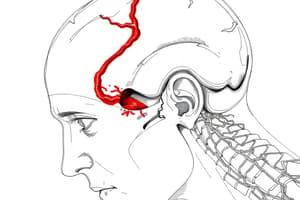Podcast
Questions and Answers
Which of the following is a major cation in the extracellular fluid?
Which of the following is a major cation in the extracellular fluid?
- Potassium
- Sodium (correct)
- Calcium
- Magnesium
What condition can result from an excess of aldosterone?
What condition can result from an excess of aldosterone?
- Hyperkalemia
- Hypokalemia (correct)
- Hyponatremia
- Hypernatremia
Which hormone plays a key role in regulating water reabsorption in the kidneys?
Which hormone plays a key role in regulating water reabsorption in the kidneys?
- Antidiuretic hormone (ADH) (correct)
- Thyroid hormone
- Aldosterone
- Insulin
Which of the following is a major anion in the extracellular fluid?
Which of the following is a major anion in the extracellular fluid?
What is the primary function of antidiuretic hormone (ADH) in the body?
What is the primary function of antidiuretic hormone (ADH) in the body?
In which condition would hyponatremia most likely occur?
In which condition would hyponatremia most likely occur?
Which of the following is a common cause of hyperkalemia?
Which of the following is a common cause of hyperkalemia?
What effect does metabolic acidosis have on potassium levels in the blood?
What effect does metabolic acidosis have on potassium levels in the blood?
Which of the following is a major intracellular cation?
Which of the following is a major intracellular cation?
Which of the following conditions is associated with a decrease in total body water?
Which of the following conditions is associated with a decrease in total body water?
What is the normal range of serum sodium concentration in adults?
What is the normal range of serum sodium concentration in adults?
Which of the following conditions is characterized by an excess of isotonic fluid in the extracellular compartment?
Which of the following conditions is characterized by an excess of isotonic fluid in the extracellular compartment?
Which of the following is a major intracellular cation?
Which of the following is a major intracellular cation?
What effect does metabolic acidosis have on potassium levels in the blood?
What effect does metabolic acidosis have on potassium levels in the blood?
What is the primary function of antidiuretic hormone (ADH) in the body?
What is the primary function of antidiuretic hormone (ADH) in the body?
Which of the following conditions is characterized by an excess of isotonic fluid in the extracellular compartment?
Which of the following conditions is characterized by an excess of isotonic fluid in the extracellular compartment?
What effect does metabolic acidosis have on potassium levels in the blood?
What effect does metabolic acidosis have on potassium levels in the blood?
What is the normal range of serum sodium concentration in adults?
What is the normal range of serum sodium concentration in adults?
Which of the following conditions is characterized by an excess of isotonic fluid in the extracellular compartment?
Which of the following conditions is characterized by an excess of isotonic fluid in the extracellular compartment?
What effect does metabolic acidosis have on potassium levels in the blood?
What effect does metabolic acidosis have on potassium levels in the blood?
What is the primary function of antidiuretic hormone (ADH) in the body?
What is the primary function of antidiuretic hormone (ADH) in the body?
Study Notes
Electrolytes in Extracellular Fluid
- Major cation in extracellular fluid: Sodium (Na⁺)
- Major anion in extracellular fluid: Chloride (Cl⁻)
Hormones and Fluid Regulation
- Aldosterone excess can cause hypernatremia (high sodium) and hypokalemia (low potassium).
- Antidiuretic hormone (ADH) regulates water reabsorption in kidneys, promoting water retention.
Sodium Levels and Hyponatremia
- Normal serum sodium concentration in adults: 135-145 mEq/L.
- Hyponatremia (low sodium) can occur in conditions such as congestive heart failure or excessive water intake.
Potassium Levels and Acidosis
- Common cause of hyperkalemia (high potassium): Kidney failure or excess potassium intake.
- Metabolic acidosis leads to increased potassium levels in the blood due to cellular shifts.
Intracellular Cations
- Major intracellular cation: Potassium (K⁺)
- Distinct from extracellular fluid, where sodium predominates.
Fluid Imbalance Conditions
- Conditions characterized by excess isotonic fluid in extracellular compartment: Hypervolemia or fluid overload.
- Decreased total body water may occur in dehydration or insufficient fluid intake.
Studying That Suits You
Use AI to generate personalized quizzes and flashcards to suit your learning preferences.
Description
Test your knowledge of fluid and electrolyte balance and disturbances with this quiz. Explore concepts related to fluid volume, osmolality, electrolyte levels, and their impact on the body's physiological processes.




